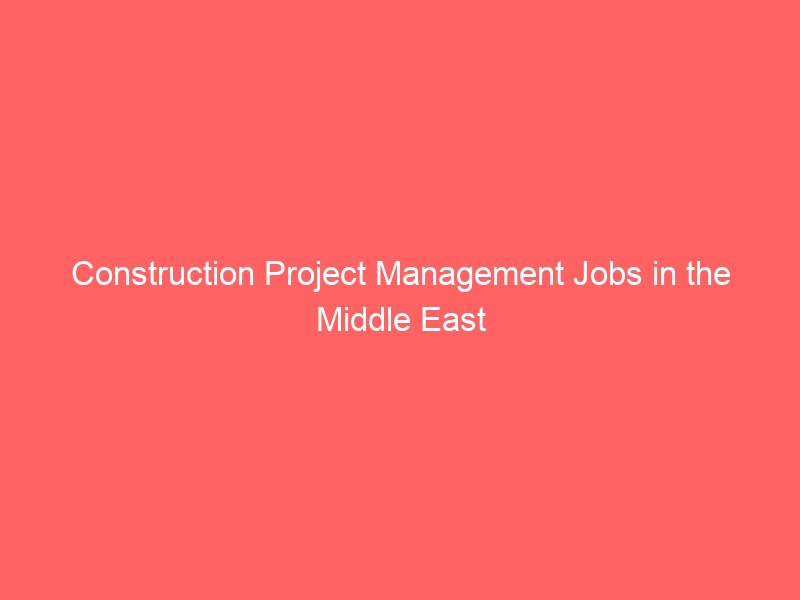The Middle East is renowned for its ambitious construction projects, from futuristic skyscrapers to sprawling residential developments. For construction project managers looking to expand their careers, the region offers numerous opportunities that come with competitive salaries and unique experiences. Here’s how to pursue a career in construction project management in the Middle East.
Why Choose the Middle East for Construction Project Management?
The Middle East, particularly countries like the United Arab Emirates (UAE) and Saudi Arabia, is a hub for large-scale construction projects driven by economic growth, tourism, and urban expansion. These projects often set global standards for innovation and architectural excellence. Working in this region not only allows project managers to oversee groundbreaking initiatives but also provides experience working in diverse, multinational teams.
Top Countries for Construction Project Management Roles
1. United Arab Emirates (UAE)
The UAE, with its iconic cities like Dubai and Abu Dhabi, continues to invest in large infrastructure and real estate projects. Project managers here often work on high-profile developments that push the boundaries of design and technology. The UAE is known for providing excellent compensation packages, including housing allowances and tax-free salaries.
2. Saudi Arabia
Saudi Arabia is undergoing rapid development with its Vision 2030 initiative, which includes megaprojects like NEOM—a futuristic city designed to be a hub for innovation and sustainability. Project managers who join these projects can gain experience in cutting-edge construction methods and sustainable building practices.
3. Qatar
Qatar has been in the spotlight for its infrastructural boom in preparation for major global events. This growth has spurred the need for skilled construction project managers who can oversee projects ranging from stadiums to luxury hotels. The country offers competitive salaries and benefits, along with a strong focus on worker safety and welfare.
Key Qualifications and Skills
- Project Management Certification: Holding a certification like PMP (Project Management Professional) or PRINCE2 is highly beneficial and often required for senior roles.
- Experience with Large-Scale Projects: Prior experience managing significant construction projects can set you apart from other candidates.
- Cultural Competence: Understanding and respecting local customs and business practices is essential for success in the Middle East.
How to Find Construction Project Management Jobs
Use Specialized Job Platforms
Websites like Bayt, GulfTalent, and Naukrigulf focus on job listings in the Middle East. Additionally, global platforms such as LinkedIn often feature construction management roles in this region.
Work with Recruitment Agencies
Recruitment agencies that specialize in placing construction professionals can provide tailored support in finding the right job. They can also offer guidance on visa processes and relocating.
Attend Industry Conferences and Fairs
Construction industry events and expos in the Middle East, such as The Big 5 in Dubai, provide opportunities to network with employers and learn about upcoming projects. These events often attract major construction firms looking for talent.
Tips for Successful Applications
- Highlight International Experience: If you have worked on international or multicultural projects, make sure to showcase this on your resume.
- Emphasize Leadership and Problem-Solving: Employers in the Middle East value project managers who can lead teams effectively and address challenges proactively.
- Tailor Your Resume: Customize your CV to highlight experiences and skills that align with the specific role and company you’re applying to.
What to Expect in Your Role
Construction project management in the Middle East often involves fast-paced work environments with high expectations for quality and efficiency. You’ll likely manage diverse teams, work closely with stakeholders from different cultural backgrounds, and adhere to strict timelines. The work culture may emphasize hierarchy and formal communication, so adapting to these norms is crucial for effective leadership.
Working hours can be demanding, especially during project deadlines. However, the region is known for providing comprehensive benefits that support a comfortable lifestyle, including generous vacation allowances and healthcare.
Final Thoughts
The Middle East is a land of opportunity for construction project managers who are ready to take on new challenges and oversee innovative projects. With proper preparation, networking, and an understanding of the regional work culture, you can build a fulfilling career that stands out on a global scale. Whether you’re drawn to the skyscrapers of Dubai, the megaprojects in Saudi Arabia, or the fast-developing infrastructure in Qatar, the region has much to offer for ambitious professionals.
